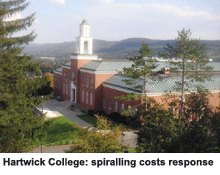Eighteen students at Hartwick College who have just finished their first semester are veritable pioneers in US higher education. Based in a remote campus of only 1,480 students in the foothills of the Catskill Mountains in upstate New York, they have set out to earn their bachelors degrees in three years rather than the traditional four.
 This tiny, private, liberal arts institution is in the vanguard of a movement towards what seems the most obvious way of reducing the spiralling costs of higher education: cutting the time it takes to get an undergraduate degree by 25 percent. “Fewer and fewer families are able to afford this experience,” says Margaret Drugovich, president of Hartwick, which charges about $43,000 (Rs.19.6 lakh) per year. “There’s only so much I can do to drive the costs down. But one of the things we can do is manage the programme in such a way that those students who are able and interested can get through the entire programme in three rather than four years.”
This tiny, private, liberal arts institution is in the vanguard of a movement towards what seems the most obvious way of reducing the spiralling costs of higher education: cutting the time it takes to get an undergraduate degree by 25 percent. “Fewer and fewer families are able to afford this experience,” says Margaret Drugovich, president of Hartwick, which charges about $43,000 (Rs.19.6 lakh) per year. “There’s only so much I can do to drive the costs down. But one of the things we can do is manage the programme in such a way that those students who are able and interested can get through the entire programme in three rather than four years.”
This idea is not entirely new — several US universities have allowed small numbers of highly motivated students to try it in the past — but it has gathered momentum this year, thanks to mounting criticism of the costs of university tuition and a widely circulated speech promoting the idea by Lamar Alexander, a former US education secretary and university president. “The three-year degree could become the higher education equivalent of the fuel-efficient car. Yet many colleges and universities are stuck in the past,” Senator Alexander told a conference of university presidents in Washington last October.
For example, the academy’s long summer holidays, which date from agrarian times, make no sense in the modern era, a former president of the University of Tennessee says. He cites figures that show that some universities use their facilities for academic purposes for less than half year.
But critics, including many faculty, retort that shortening bachelors degrees is akin to manufacturers responding to the recession by maintaining a product’s price while reducing its size. It is a question of value for money, they argue. “Do you aim to have people learn as much in three years as they do in four, or are you just changing the meaning of a bachelors degree from the current amount of whatever it is to 25 percent less than that?” asks Michael McPherson, an economist, former president of Macalester College in St. Paul, Minnesota, and the author of Keeping College Affordable. “Maybe there’s some secret to making every hour you spend in college more productive than it used to be,” he adds.
Yet many US universities are starting to consider them. Rhode Island lawmakers are studying the idea of letting students in their final year of school — the 12th grade — take courses at the state’s public universities, reducing the amount of time and money it takes to finish bachelors degrees.
Charles Reed, chancellor of the cash-strapped California State University system, is interested in the idea, too. “I’d like to see us do away with the 12th grade,” he says. “That’s the biggest waste in education.”
In general, however, the time it takes to graduate in America is rising, not falling. The current average is six years and seven months, as students drop in and out for financial reasons, fail to find places on courses they need to complete or stay at university because it is more fun than working for a living.
(Excerpted and adapted from Times Highe Education)